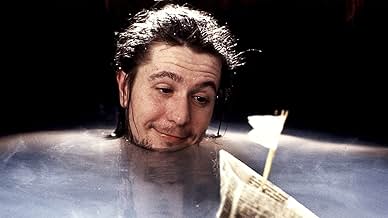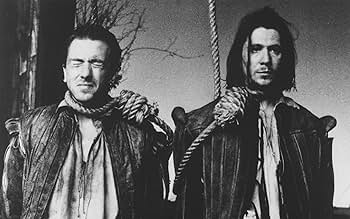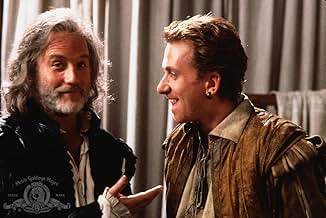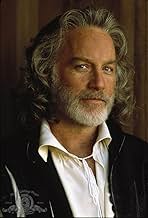Zwei Nebenfiguren aus dem Stück "Hamlet" stolpern umher, ohne sich ihres geskripteten Lebens bewusst zu sein und ohne von diesem abweichen zu können.Zwei Nebenfiguren aus dem Stück "Hamlet" stolpern umher, ohne sich ihres geskripteten Lebens bewusst zu sein und ohne von diesem abweichen zu können.Zwei Nebenfiguren aus dem Stück "Hamlet" stolpern umher, ohne sich ihres geskripteten Lebens bewusst zu sein und ohne von diesem abweichen zu können.
- Auszeichnungen
- 3 Gewinne & 2 Nominierungen insgesamt
- Tragedian
- (as Srdjan Soric)
- Laertes
- (as Sven Medvesck)
Empfohlene Bewertungen
The characters spend the entire film coming to terms with their existence. Shakespeare didn't provide any detailed character development of either Rosencrantz or Guildenstern, and as such, they are left confused as to the purpose of their own existence.
The film also looks at the concept of a predetermined destiny. Rosencrantz and Guildenstern's fate is already determined before the film begins. And although they play an important role in one of the greatest stories ever told, they are completely unaware of their destiny; they are merely victims of circumstance.
I should also note that the constant banter between the two characters (specifically in their 'Game of Questions') is pure quality.
It's weird and it absolutely isn't going to work for some people but I love this one. It's so unique and fun, creative and inventive and I try to give props to any movie setting out to be as different as this one especially when it actually succeeds at what it's trying to do. Strong recommend here, whether you're familiar with Hamlet or not, though a loose understanding of the play would likely be beneficial.
The lead roles are extremely well cast. Gary Oldman is hilarious as sweet, befuddled Rosencrantz. Tim Roth's angry, frustrated Guildenstern is the perfect complement. They make a great team.
Stoppard's film has a sprightly step even when raising a few cosmic questions. It's the perfect tonic for some of the more pompous cinematic takes on Shakespeare, and even the Bard would appreciate its sparkling wordplay.
Out of all of the timeless Shakespearian tragic protagonists or even supporting players, few would prove less memorable and recognized than Rosencrantz and Guildenstern, background players in Hamlet who are given no development, little purpose, and, apart from a single line mentioning their offstage deaths in passing, no closure. As such, it is nothing less than a delightfully ingenious decision on writer/director Tom Stoppard's part to re- examine Hamlet from the perspective of the two characters who seldom play any part in it, and in between question their purpose, their reason for being there, what they are attempting to accomplish and their inability to remember anything before being brought into the story. Such a work is Rosencrantz & Guildenstern are Dead: an absurdist, existential take on the tragedy of the Prince of Denmark, for which rational description proves fleeting and incomplete. Consider the film as an amalgamation of its source material, Shakespeare's Hamlet, Beckett's absurdist Waiting for Godot, and the irreverent comedic stylings of Abbot and Costello and Monty Python - and even this fails to exactly capture the unique stylistic blend that is the film.
As with many such experimental works, Rosencrantz & Guildenstern are Dead will likely not prove appealing to all tastes, particularly not for those devoid of a healthy tolerance for theater of the absurd and existential or otherwise philosophical ramblings with no real definitive outcome or purpose. However, Stoppard's exquisitely witty and verbose script is rattled off at a breakneck pace, making up for the occasional lull in pacing and absurdist silent interludes which fail to add much to the plot. Despite its theatrical origins, the work makes a surprisingly fluid transition to film, with some fittingly minimalist cinematography helping it feel less stage oriented. The somewhat low budget appearance of the production, as opposed to being a detriment, actually adds an endearing and introspective quality to the film, as if meant to look like it was being performed by a low budget theater group. Similarly, the film's musical score is just bizarre and comically unsettling enough to promote the perfect offbeat mood throughout.
Stoppard's work also deserves tremendous commendations for his work's introspective challenging conventions of theater and audience expectations by leaving many plot points unexplained or up for subjective interpretation. The constant question as to whether the two titular characters are actors, seemingly so into character that they have forgotten the nature of their putting on a play (pages from the script of Hamlet drift tantalizingly around the scenery throughout, suggesting this possibility) or the actual characters themselves within the world of the play, unaware as to their fictional nature, ultimate lack of purpose and inescapable impending fate is never fully resolved, and ultimately never seems to make much of a difference. The play's treatment of fatalism and pre-determination in artistic works is similarly intriguing - as Dreyfus' Player (seemingly the only fully informed character in the play) explains, the events which befall the two bewildered protagonists are not decided, but "written". However, Stoppard never draws the distinction between introspective artistry or just plain absurdity, leaving it up to his audience to fill in many of the film's gaps and come to their own conclusions, but his inspired storyline proves consistently entertaining in the midst of its frequently nonsensical philosophical banter. Similarly, the script's exploration of the frequently misleading and deceptive power and ambiguity of words leads for some turns of phrases worthy of Shakespeare himself, whose dialogue style Stoppard frequently mocks and simultaneously pays tribute to.
Without such an accomplished cast putting their own unique spin on the material, it is hard to imagine such a difficult play being transposed into such a highly enjoyable movie. Gary Oldman and Tim Roth are perfectly cast as the consistently bewildered titular duo, and their quirky chemistry and impeccable comedic timing makes for some of the most enjoyable back and forth routines in recent memory (the verbal tennis match is an abiding classic, but is only a fraction of the comedic brilliance the two muster up) - an absurdist Abbot and Costello if you will, with Oldman's loopy Rosencrantz making a ideal foil for Roth's curt straight man Guildenstern. A fittingly grandiose Richard Dreyfus is a consistent scene stealer, making superb use of many of the best lines in the script as the lead player in the theatrical group performing for the royal family. Similarly, Iain Glen makes a suitably manic Hamlet, and Donald Sumpter and Joanna Miles prove wonderfully theatrical as King Claudius and Queen Gertrude, always lost in the wistful world of the play.
Unconventional, bizarre, thought provoking and consistently funny, Rosencrantz & Guildenstern are Dead will certainly isolate certain audiences, in particular those with little tolerance for theater of the absurd. But for those willing to partake in material outside the parameters of the mainstream will experience an intelligent, fast paced and astutely acted metaphysical comedy, one whose blend of unpretentious philosophy and irreverent comedy proves difficult to resist.
-8.5/10
Wusstest du schon
- WissenswertesOriginally, the two leads (who appropriately spend the movie mixing up their own names) were cast the other way around.
- PatzerThroughout the movie there are scenes where day suddenly changes to night and vice versa. This is a running gag of Tom Stoppard plays which often have "time jumps" written into the stage directions.
- Zitate
Rosencrantz: Do you think Death could possibly be a boat?
Guildenstern: No, no, no... Death is "not." Death isn't. Take my meaning? Death is the ultimate negative. Not-being. You can't not be on a boat.
Rosencrantz: I've frequently not been on boats.
Guildenstern: No, no... What you've been is not on boats.
- VerbindungenEdited into Spisok korabley (2008)
Top-Auswahl
- How long is Rosencrantz & Guildenstern Are Dead?Powered by Alexa
Details
- Erscheinungsdatum
- Herkunftsländer
- Sprache
- Auch bekannt als
- Rosencrantz y Guildenstern han muerto
- Drehorte
- Produktionsfirmen
- Weitere beteiligte Unternehmen bei IMDbPro anzeigen
Box Office
- Bruttoertrag in den USA und Kanada
- 739.104 $
- Eröffnungswochenende in den USA und in Kanada
- 24.004 $
- 10. Feb. 1991
- Weltweiter Bruttoertrag
- 739.104 $
- Laufzeit
- 1 Std. 57 Min.(117 min)
- Farbe
- Seitenverhältnis
- 1.85 : 1































